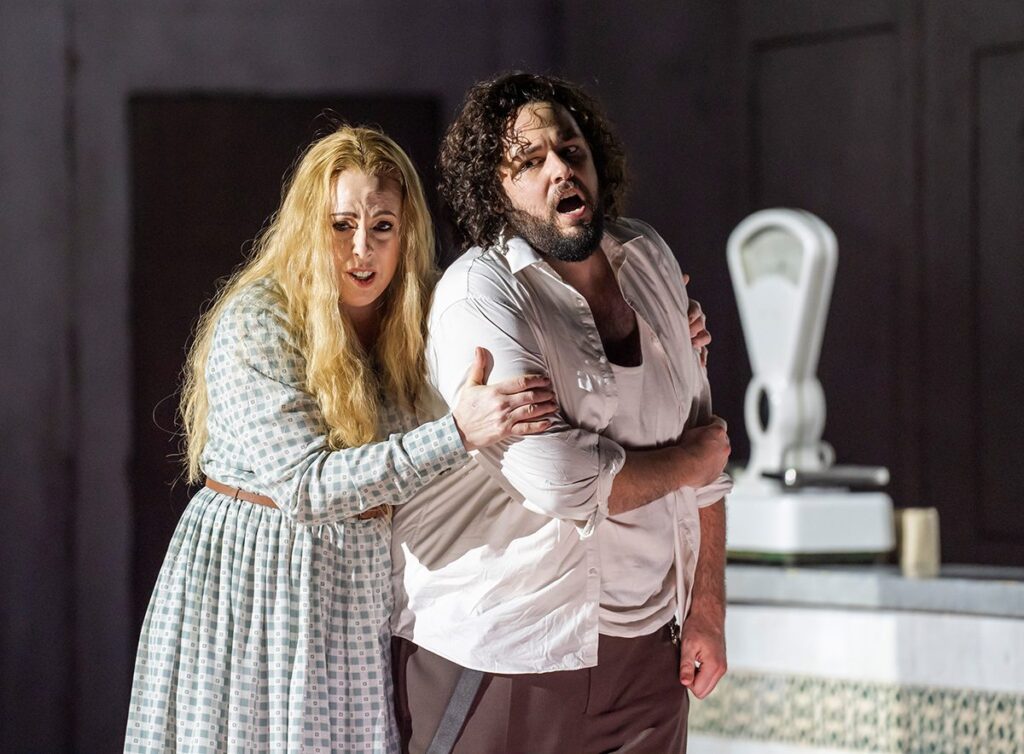Leeds Grand Theatre – On Tour until March 2024
Reviewed by Dawn Smallwood
4****
Cavalleria Rusticana and Aleko is a double bill and part of this Opera North’s season and firstly performed at the Leeds Grand Theatre. Mascagni’s Cavalleria Rusticana (Rustic Chivalry) is a melodrama based on Giovanni Verga’s play and set to Giovanni Targioni-Tozzetti and Guido Menasci’s libretto. This production first performed in 2017 as part of Little Greats seasons. Rachmaninov’s Aleko, a new and first ever production for Opera North, is a one-act opera. It is based on Alexandr Pushkin’s Tsygany (The Gypsies), and the libretto is written by Vladimir Nemirovich-Danchenko.
First performance is Cavalleria Rusticana, and the melodrama is highly emotive story with strong themes of love, jealously, anger and revenge. It is about Turiddù (Andrés Presno) who dates Lola (Helen Évora), but she subsequently marries Alfio (Robert Hayward). Angry Turiddù seduces Santuzza (Giselle Allen), who is devoutly religious, but he eventually returns to Lola (Helen Évora) and they both pursue an affair. Santuzza confronts the affair and experiencing Turiddù’s denial, she alerts Alfio and tells him of his wife’s infidelity. Strong feelings erupt which leads to Turiddù’s fate.
After the interval, Aleko, in similar vein to Cavalleria Rusticana, is about Aleko and Zemfira, a married couple, who live in a liberal community where the world is in their hands and that love must be free. Zemfira (Elin Pritchard), like her mother, falls in love with another man, a younger one. Zemfira’s affair disturbingly draws Aleko (Hayward) to despair and anger and he seeks revenge. His vengeance fatefully leads him to be an outcast of the community. Aleko intertwines with Cavalleria Rusticana where references from the melodrama are visibly present in the opera with appearances by Lola, Santuzza and Lucia, Turiddù mother (Anne-Marie Owen).
Both operas have a number of similarities particularly the themes and the musical composers composed their works at a similar time, end of the 19th Century, and are of a similar age. Strong emotive and excellent portrayals from Presno as Turiddù (Cavalleria Rusticana), Allen as Santuzza (Cavalleria Rusticana), Hayward as Alfio (Cavalleria Rusticana) and in Aleko, and Pritchard as Zemfira (Aleko). They are harmoniously supported with rest of the cast and the Chorus of Opera North.
The sets and costumes, designed by Charles Edwards and Gabrielle Dalton, are such a contrast. There is the tight knit religious community in Cavalleria Rusticana and in Aleko the liberal and free thinking and loving commune. Both settings are complemented with Charles Edwards’ lighting.
Both Cavalleria Rusticana and Aleko, under the direction of Karolina Sofulak and musically by Antony Hermus, are well put together and excellently interlinked and executed. Both performances are quite different, but the themes and cues are so coincidentally the same

